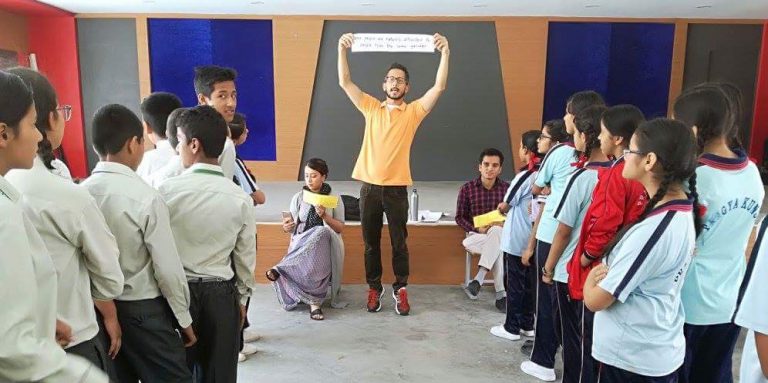
Kathmandu (Pahichan) June 1- As the final performance of The Laramie Project: Ten years Later with stories from Nepal ended, the curtains did not close. Instead the small stage at the Nepal Tourism Board was fully lit, and both actors and the audience basked in the afterglow of the play.
The Nepali adaptation of the play called Hate is Not a Nepali Value includes true accounts of the LGBTIQ experience in Nepal. They were taken from the book, Pride Climbing Higher, a writing project by Creative Nepal and the Blue Diamond Society (BDS). A few of the writers in this book featured prominently in the play produced by One World Theatre.
The Laramie Project is a docudrama by the Tectonic Theater Project based on the brutal murder of Matthew Shepard in Laramie. Shepard was 22 when he was murdered in what became one of the most significant global hate crimes. Shepard was gay and HIV positive. The play’s script is based on interviews with family, friends, police officers, and the murderers. Ten Years Later includes interviews with the same people.
“Ten years of change, no progress,” is a poignant line in the play. Since Shepard’s murder ten years ago, there have been protests, legal tussles, abuses, and change, but the LGBTIQ community in many parts of the world believe change is not enough. Progress has to be made, they say, especially at the top rung by people who influence policy.
Nepal is the first Asian country, and third in the world (after South Africa and Ecuador) to specifically include LGBTIQ rights in its Constitution. Articles 12, 18, and 42 of Nepal’s new Constitution ensure full protection of LGBTIQ people. But activists and the community feel Nepal’s legal progress has not managed to impact the country’s socio-cultural and psychological make-up as well as it should, and could.

The Laramie Project’s Educational Outreach Programme
Photo: Bruno Deceukelier
The Laramie Project goes beyond just being a play here in Kathmandu. It has created space and the opportunity to engage Nepali society at various levels, including at schools and colleges. An educational outreach programme supported by UNAIDS began two years ago when the play was first staged in Nepal. It has continued with Ten Years Later. Students are invited to watch the play and engage in discussion before and after.
“This time it’s been even more powerful because the play itself included stories from Nepal, performed by people who belong to the BDS and LGBTIQ communities,” shares Niranjan Kunwar, an educational consultant who has been involved with the outreach programme from the outset. Kunwar tells Onward Nepal that due to the sensitivity that still surrounds LGBTIQ issues in Nepal, he has had to prepare students for the play: A pre-show to introduce students to LGBTIQ issues through conversation on differences and discrimination that are not gender or minority-based, and then a post-show to get students to reflect on the play and the themes emerging from it.

The Laramie Project’s Educational Outreach Programme
Photo: Gunjan Dixit
Members of the Blue Diamond Society are actively involved in the outreach programme as well. BDS was established in 2001 by Nepal’s first openly gay politician, Sunil Babu Pant, to work for and with sexual minorities. This was at a time when sexual minorities were not legally recognised so the NGO was first registered as a sexual health programme. 16 years on, BDS says they have been able to reach out to 350,000 members of the LGBTIQ population in the country.
Bishwaraj Adhikari, a gay rights activist with BDS, states the total LGBTIQ population in Nepal is estimated to be at 900,000. He says this was discovered after a nationwide survey carried out two years ago by the NGO.
BDS members participate in the student outreach programme with honesty and plenty of humour. In one session at Thames International College, a student asked transgender activist, Sushila Lama, if people talking negatively behind her back affected her. “I talk about the Prime Minister like that too, but I doubt it affects him. It’s the same with me too,” Lama quipped.
When Lama was asked to react to the line “Ten years of change, no progress,” she said there has been both change and progress in Nepal. At the public level, she uses the example of the Supreme Court passing favourable judgments involving the LGBTIQ community. At the personal level, Lama says she is now able to fully celebrate being a transgender woman .
“In our community and in society, there are a lot of positive changes,” Lama shares. And with an openhearted laugh, Lama adds, “I have felt it.”
Copy : http://www.onwardnepal.com
Copyright © All right reserved to pahichan.com Site By: Sobij.